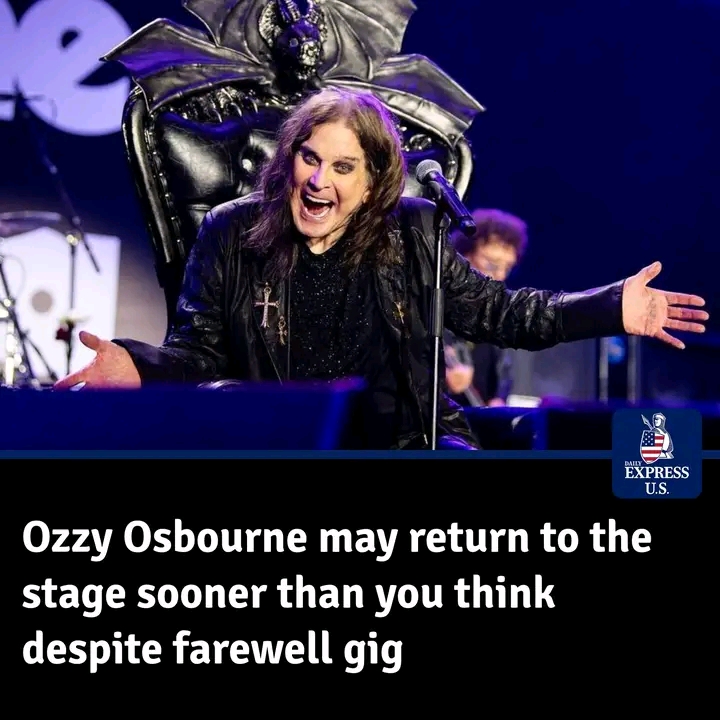Black Sabbath Files for New Trademark, Eyes Hologram Performances After Ozzy Osbourne’s Farewell Gig
In a move that signals both nostalgia and innovation, Black Sabbath—the pioneers of heavy metal—have officially filed documents to trademark their legendary name once again. This strategic legal step, filed shortly after Ozzy Osbourne’s emotional farewell show, has stirred speculation about the band’s next chapter, including the possibility of using hologram technology to extend their legacy far beyond traditional live performance.
Protecting the Sabbath Legacy
According to filings with the U.S. Patent and Trademark Office, Black Sabbath’s new trademark application covers not only traditional merchandise like apparel, posters, and collectibles but also digital entertainment experiences. Among the listed uses: “virtual performances, including holographic concerts, immersive audio-visual experiences, and digital avatars.”
For fans and industry insiders, this language speaks volumes.
“This isn’t just about t-shirts and tour programs anymore,” says entertainment attorney Lisa Arnold, who specializes in music intellectual property. “Black Sabbath is preparing for the future of entertainment. They’re setting the stage for virtual concerts, holographic performances, and perhaps interactive fan experiences that transcend the limitations of time and age.”
The Timing: Ozzy’s Emotional Goodbye
The filing comes just weeks after Ozzy Osbourne’s massive charity-driven farewell show, Back to the Beginning, which raised an astonishing $190 million for children’s hospitals and shelters. The “Prince of Darkness” told fans during his set, “This might be my last time on stage, but the spirit of Sabbath will never die.”
Now, those words seem to take on deeper meaning. While Ozzy may be stepping away from live performance due to health issues, the Black Sabbath name appears ready to evolve into new formats—formats that don’t require the physical presence of the original members.
The Hologram Question: Is Sabbath Going Virtual?
Hologram performances have become a controversial yet increasingly common way to keep musical legacies alive. From Tupac Shakur’s digital resurrection at Coachella to the ongoing ABBA Voyage residency in London, where fans watch lifelike “ABBAtars,” the technology has both captivated and divided audiences.
Could Black Sabbath be next?
Sources close to the band suggest the answer is yes. While no official announcement has been made regarding specific hologram projects, the trademark language leaves the door wide open. Terms like “virtual entertainment services,” “digital avatars,” and “augmented reality concerts” point clearly toward the possibility of Sabbath joining the ranks of legacy acts exploring futuristic ways to connect with fans.
“Imagine hearing ‘War Pigs’ or ‘Paranoid’ in full stadium surround sound, while holographic versions of Ozzy, Tony Iommi, Geezer Butler, and Bill Ward appear in front of you,” says music historian Darren Collins. “For fans who never saw them live, this could be the next best thing.”
Fans React: Excitement Meets Skepticism
The news has sparked mixed reactions in the metal community. Some fans are excited by the idea of experiencing Black Sabbath in any format, while others fear that holograms could cheapen the authenticity of the band’s legacy.
“It’s bittersweet,” wrote one fan on Reddit’s metal forum. “Of course I’d go see a Sabbath hologram show—who wouldn’t? But at the same time, nothing will ever replace the raw, live energy of Ozzy screaming into a microphone in person.”
Others, however, view the move as a natural progression. “Black Sabbath invented heavy metal,” said another fan. “Why shouldn’t they also pioneer the next generation of concerts? They’ve always been ahead of their time.”
Sharon Osbourne’s Role
Sharon Osbourne, Ozzy’s wife and long-time manager, is believed to be a driving force behind the trademark filing. Known for her sharp business acumen, Sharon played a crucial role in orchestrating Ozzy’s farewell event and has openly discussed the future of entertainment, including virtual reality and digital performances.
During a recent interview, Sharon hinted at what’s next: “The world is changing. We have to think about how to preserve these legendary moments and make them accessible to new generations. Technology allows us to do that in ways we never could before.”
The Business of Immortality
For Black Sabbath, the new trademark filing isn’t just about concerts; it’s about cementing their cultural immortality. By controlling their name, image, and potential digital likenesses, the band can ensure that any future uses—whether in movies, video games, virtual reality, or even AI-generated music collaborations—remain under their watchful eye.
Industry analysts estimate that the virtual concert market could be worth over $20 billion globally by 2030. For Sabbath, tapping into this arena could both honor their history and create new revenue streams, ensuring their music remains alive for decades to come.
What’s Next?
As of now, there is no official tour—or hologram tour—on the calendar. However, the trademark filing makes it clear that Black Sabbath is actively preparing for a future where music, memory, and technology collide.
Whether you’re a purist who only wants vinyl and sweaty live gigs, or a tech enthusiast ready for the next frontier of entertainment, one thing is certain: Black Sabbath isn’t done casting their long, dark shadow across the music world.
In the words of Ozzy himself, “This is not the end. It’s just another beginning.”
